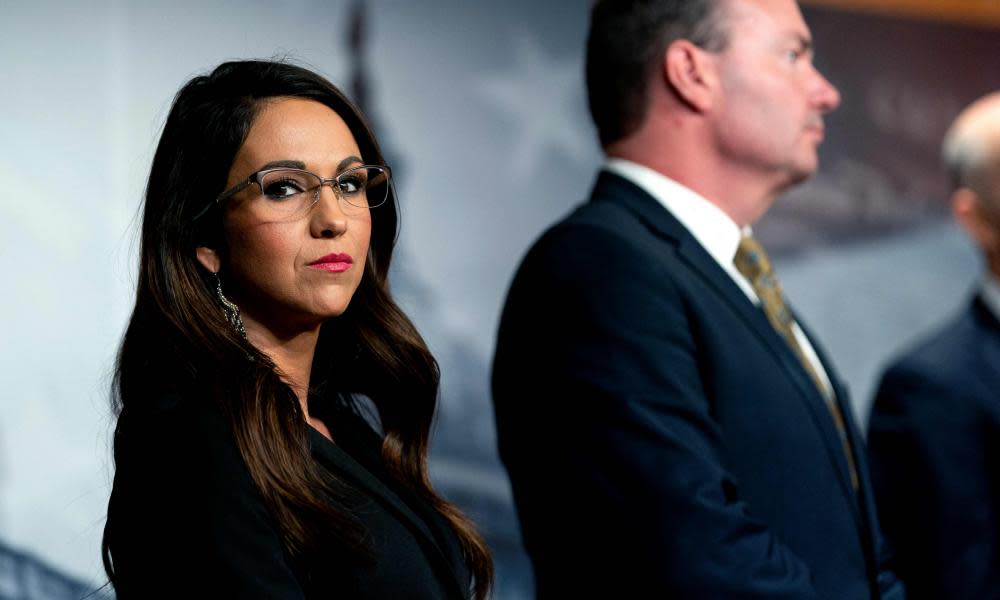Wee the people: Republican Boebert presses DC witness on public urination

In bizarre scenes in a US House hearing, the far-right Republican Lauren Boebert asked if a revised Washington DC criminal code was now law – only to be reminded that Congress overturned it earlier this month – then fixated on whether that code would have decriminalised public urination.
Related: A crime bill was supposed to fix Washington DC’s problems. Instead, it polarized a city
The revision was meant to give the District of Columbia a first code update in 120 years, but it became subject to fierce debate over crime as a political issue. Republicans said the code was soft on violent offenses. Angering progressives, Joe Biden said he would not veto a Republican measure to overturn the code.
Charles Allen, a city councilman, chaired the DC judiciary committee which considered the revisions.
On Wednesday, Allen was one of four witnesses at the mercy of House Republicans in a hearing entitled “Overdue Oversight of the Capital City”.
Allen, DC council chair Phil Mendelson, chief financial officer Glen Lee and Greggory Pemberton of the DC Police Union faced aggressive Republican questioning, mostly regarding policing and crime, including the stabbing last weekend of a staffer to the Republican senator Rand Paul.
But Boebert’s fixation on public urination made the biggest splash.
The pro-Trump Coloradan, who has a history of inflammatory behavior, asked: “You led the charge to reform DC’s crime laws. Is that correct?”
Allen said: “I chaired the committee that proposal came from, yes.”
Boebert said: “You led the charge, yes sir. And these changes are now law here in DC. Correct?”
Allen said: “You mean the revised criminal code? No, those are not the law.”
Boebert appeared confused. Mendelson said: “The revised code was rejected by – ”
Cutting Mendelson off, Boebert pressed Allen.
“Did you or did you not decriminalise public urination in Washington DC? Did you lead the charge to do so?”
Allen said: “No. The revised criminal code left that as a criminal.”
Boebert repeated: “Did you lead the charge to decriminalise public urination in Washington DC?
Allen said: “No, ma’am.”
Boebert said: “Did you ever vote in favor of decriminalising public urination in Washington DC?”
Allen said: “The revised criminal code that was passed by the council kept it as a criminal offense.”
Boebert said: “Did you ever support this criminal” offense status?
Allen said: “I voted for it, yes.”
Boebert said: “You voted to keep it as a criminal offense?”
Allen said: “That’s correct. The full council did.”
Boebert claimed to “have records” showing Allen favored “allowing public urination”.
Allen said: “No. The –”
Boebert asked: “Is that something you intend to pursue in the future?”
Allen said: “No. The legislation you’re referring to came from the criminal code reform commission that changed public urination from a criminal to a civil offense. The council then changed that, to maintain it as a criminal offense at the request of the mayor.”
Boebert yielded her time.
Addressing the witnesses, Becca Balint, a Democrat from Vermont, lamented: “Rather than addressing a number of serious concerns our constituents have, [Republicans] are choosing to waste our time talking about public urination. Do you have anything additional you want to say about public urination?”
Boebert said: “I do.”
Balint said: “No, not you. It’s not your time. It’s a question to these people.”
In conclusion, Jamie Raskin of Maryland, the ranking Democrat on the panel, said: “This has been a degraded, tawdry discourse today, with obsessive questioning about public urination.”
“I hope the public doesn’t see this hearing and regard all of it as an episode of public urination in which the people of Washington are the ones getting rained on.”

 Yahoo News
Yahoo News 
